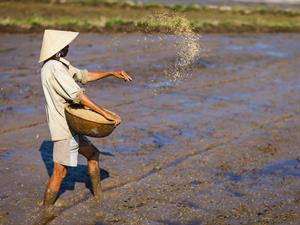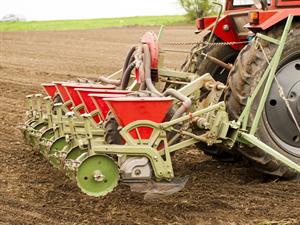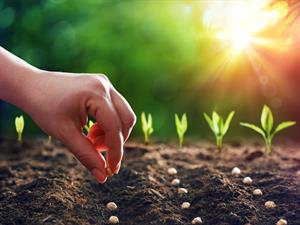PDF chapter test TRY NOW
Seed sowing is the second step in the production of crops. Once the soil is turned well and loosened, it will be ready for sowing the seeds. 


Sowing is the process of planting seeds in the soil.
Before sowing the seeds, good quality and healthy seeds are selected carefully to get high yield and high quality. This is called seed selection. The methods followed for sowing seeds are:
1. Sowing by hand: Scattering seeds by hand in the loosened soil is a simple method of seed sowing. It is also called broadcasting. Sowing by hand is the most economical method among the sowing methods.

Sowing by hand
2. Seed drill: Also called seeder, which is a modern method of seed sowing. It is a device used for better and more efficiency. It is done by attaching iron drills to a tractor. It ensures that the seeds are planted at equal intervals, distributed evenly, and at a specific depth in the soil.

Seed drill
3. Dibbling: Placement of seeds in a hole, furrow, or pit at a definite spacing with a dibble, by hand. Soil present around the hole is pressed with hand or leg for moist soil contact.

Dibbing
The sowing of seeds is the most important part of crop production. Precautions taken while sowing seeds include:
1. Seeds should be sown at a proper distance depending on the crop (varies from one crop to another). This ensures that the plants obtain light, water, and nutrients for growth and development. Planting seeds at equal distances increases the yield of the farm.
2. Seeds must be sown at a correct and specific depth. If the seeds are simply scattered on the top they may be blown away or eaten by animals or birds. If the seeds are sown deep into the ground, they do not germinate due to the lack of air.
3. Seeds sown should be of the highest quality and free from all diseases.
Important!
Transplanting or replanting is the technique of removing a growing seedling from one place (nursery bed) to the main field for its growth until harvest. It uses transporting pre-grown plants, seedlings, or vegetatively propagated clones. Transplanting is used in paddy.
Reference:
Peter Stuckings/Shutterstock.com
